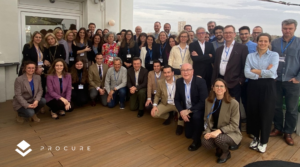At the beginning of this year the RSCN along with public and private organisations from a number of other EU Member States were awarded funding under the EU4Health programme to undertake an assessment of healthcare procurement practices. The partners represent a mix of public and private healthcare institutions, healthcare procurement organisations, and other supporting organisations and networks. Member States participating in the project, titled PROCURE, are: Austria, Belgium, France, Greece, Hungary, Italy, Malta, Slovakia, Spain, Sweden, Portugal, and Romania.
The COVID-19 pandemic highlighted a need for coordination and cooperation at EU, national, regional, and even local level in the healthcare sector. In the area of public procurement, COVID-19 exacerbated existing weaknesses along the supply chain. New approaches to healthcare procurement are therefore needed to improve resilience of the healthcare systems in order to increase their readiness for future public health emergencies.
This is the task facing the partner organisations. PROCURE’s goal is to make current healthcare procurement practices more resilient and efficient across the European Union, and to ensure that public health and care procurement systems can respond to future emergency crises and pandemics. An ambitious work programme has been developed by the partners which will provide for a detailed assessment of the health and care systems and the procurement practices within the participating Member States involved in the project. The assessment will focus on the impact the COVID-19 pandemic had on procurement organisations and practices. By means of comparison with the procurement processes prior to the pandemic, PROCURE will determine what changed and identify new strategies, action plans and policies that have been incorporated into public procurement as a result of the COVID-19 crisis.
During the project the partners will meet with the healthcare institutions and procurement organisations from the Member States to understand the issues they were facing and how procurement practices were implemented both before and during the pandemic. Crucially the organisations will share their insights, approaches and any good practices or lessons learned that could be applied at EU, national, regional, or local levels during any future healthcare emergency or crisis.
PROCURE partners include healthcare public procurers and related organisations: GOeG from Austria, MERCURHOSP from Belgium; RESAH from France; EKAPY from Greece; NNK from Hungary; SCR Piemonte, AReSS Puglia and InnovaPuglia S.p.A from Italy; SVP from Malta; SPMS from Portugal; St Spiridon Hospital from Romania; Ministry of Health from Slovakia; SAS (including their Affiliates FISEVI and FIMABIS), CSC and SALUD (including their Affiliate IACS) from Spain; Purch CPB from Sweden; Procurers’ Association, EHPPA from France; Association of Private Hospitals, UEHP from Belgium; Suppliers Association, MEDTECH Europe, from Belgium; and Supporting Organisations/Networks: SILO, and UPM from Spain, and the RSCN from Belgium
The RSCN is WP5 Leader. WP5 aims to deliver effective and impactful dissemination and communication of the project results. Specific objectives are to: support other WPs and project participants in reaching their goals by engaging with defined target audiences. Raise awareness about the project. Ensure project’s sustainability: design the adoption strategy and promote the implementation plans at national and/or regional level. Provide the tools for the future policy evaluation once that the new procurement strategies are implemented.
The PROCURE project will last for 18 months. A range of recommendations on future healthcare procurement practices, along with a policy framework for EU healthcare procurement will be delivered to the European Commission at the end of the project. These will also be presented to EU healthcare institutions, and healthcare procurement organisations at a major conference in the middle of 2025.
Further information on the project and to register for the PROCURE newsletter is available at www.projectprocure.eu and LinkedIn

